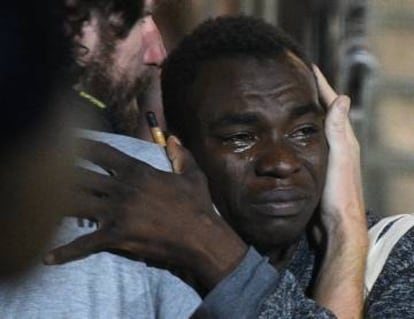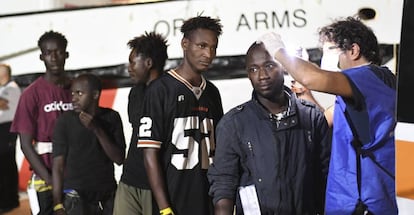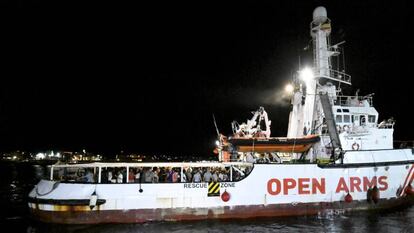‘Open Arms’ docks in Italian port of Lampedusa after 20 days at sea
The Spanish rescue ship arrived on the island around midnight following an order from a Sicilian public prosecutor, who called the situation on the vessel “of utmost urgency”

The ongoing crisis over the Spanish NGO rescue ship Open Arms took a new and unexpected turn last night. After 20 days with no solution in sight for the migrants on board, the vessel was finally given permission to dock in Lampedusa. The Open Arms had been anchored just 800 meters from the Italian island since Friday, with the country’s authorities refusing it entry and Spain coming up with a number of different solutions – all of which the NGO had refused.

The decision finally came from Luigi Patronaggio, the Italian public prosecutor in Agrigento, Scicily. After inspecting the ship, he ordered it to be seized and for the 83 or so migrants still on board to disembark. Minutes after the order came from the prosecutor, the Spanish Navy ship Auduz set sail from Rota, Cádiz, after the Spanish government decided to send the military to collect the migrants and bring them to a port in the Balearic Islands.
The Open Arms entered the port of Lampedusa slowly at about midnight last night, escorted by two Italian Coast Guard patrol boats. The migrants, who were seen in a video released by the NGO celebrating Patronaggio’s decision with applause and hugs, then began to disembark from the boat after a brief inspection by the port police.
Some came down the stairs with difficulty; others had to stop halfway, dazzled by the spotlights that the authorities had installed in the port. All of them said goodbye to the ship’s crew with hugs and smiles.
The Italian officers took the migrants in small groups via vans to the island’s reception center, where they will spend one or two days before being taken to another, national system. When the vans left the port, a group of people applauded and shouted “Welcome!” while there were some boos and jeers.

The disembarkation process took more than an hour and concluded at around 1.15am local time. As the migrants came off the ship, they were first subject to a medical check in an ambulance, before boarding the aforementioned vans. Some of the migrants were clearly afraid, some were overcome with emotion and others were smiling.
“The situation on the boat is explosive, and of utmost urgency,” said the prosecutor Patronaggio, who had arrived in Lampedusa on a helicopter accompanied by two doctors. Sources cited by Spanish news agency EFE said that Patronaggio is investigating a potential offense relating to article 328 of the Italian Criminal Code, which sets out punishment of up to two years of jail time for a public servant who fails to perform a duty that, “for reasons of justice or public security, public order or hygiene or health, must be complied with without delay.” Without expressly citing him, all the evidence points to the Italian interior minister, Matteo Salvini, as being the target of the probe, after he forbid the boat from docking on Italian shores despite the dramatic situation of the immigrants on board.
Salvini had anticipated the possibility that the prosecutor would take measures against him, and said that he was prepared to assume the “personal risk” of maintaining his closed-doors policy. The far-right leader criticized his colleagues in the government who were calling for the Open Arms to be allowed to dock, especially after having “convinced” Spain to send a Navy ship for the immigrants, and accused the NGO of attacking the sovereignty of his country.
The situation on the boat is explosive, and of upmost urgency
Italian prosecutor Luigi Patronaggio
The already critical situation on the migrant rescue ship had got even worse on Tuesday. After the prosecutor had boarded, two more migrants were evacuated for medical reasons. This was in addition to the eight medical evacuations that were seen on Monday night, given their need for “urgent medical assistance.” On Tuesday morning, a Syrian migrant jumped overboard in an attempt to swim to nearby Lampedusa and was rescued by the Italian Coast Guard, who took him to port where he was collected by an ambulance.
The cameras that were broadcasting live from the scene captured a steady flow of migrants who yesterday also jumped overboard to try to reach the coast. In the morning a group of nine jumped over the side of the Open Arms, while five more did so in the afternoon. All of them were rescued by the Italian authorities or speedboats from the NGO vessel. Five of them were taken to land.
These incidents were repeats of those seen on Sunday morning, when at least four migrants jumped ship and tried to swim to the coast.
On Tuesday afternoon, the acting Spanish government announced that it would be sending the Navy ship to collect the migrants from the Open Arms. “After analyzing a number of different options, the Spanish government, in accordance with the logistic recommendations of the Navy, believes that this one is the most appropriate and will allow for the resolution this week of the humanitarian emergency on board,” the acting Socialist Party administration announced via a statement.
The Spanish government planned for the Audaz to accompany the Open Arms back to Spain, something that will now be impossible since the Italian prosecutor ordered it to be seized.
The acting Spanish government has sent a Navy ship to collect the migrants from the Open Arms
The Spanish Navy ship set sail 90 minutes later than scheduled on Tuesday, after preparative and supply tasks were completed, including the embarkation of medical personnel to deal with the migrants and a security team. The journey to Lampedusa was due to take three days with the return journey planned from Sunday. At Palma, in the Balearic Islands, the regional government was already preparing a temporary shelter for the migrants.
“What I know is that I have to go to Lampedusa, and once there, I’ll get more concrete instructions,” said the captain of the Audza, Emilio Damiá, before the Navy ship set sail on Tuesday. “According to how everything develops and what the government determines, we will react accordingly.”
Since June last year, authorities in Malta and Italy have banned rescue ships carrying migrants from docking at their ports unless a previous agreement existed to relocate them to other countries.
The European Union has been unable to make Italy and Malta change their position, nor has it come up with a reliable strategy for providing rescue boats with safe ports. In cases where a rescue ship is denied entry, like the Open Arms, the European Commission acts as a mediator between member states. The process is unpredictable, slow, and forces boats to spend up to three weeks at sea waiting for authorization to dock.
While the Open Arms may have finally reached shore, a second rescue ship in the area, the Ocean Viking, operated by Doctors Without Borders and SOS Méditerranée, has been denied port entry. This vessel is carrying 356 people on board, including 74 minors.
‘Open Arms’ facing €901,000 fine in Spain

The NGO Proactiva Open Arms, which is responsible for the Open Arms migrant rescue ship at the center of this latest migration crisis, is facing a fine of €901,000 in its home country of Spain, after flouting the Public Works Ministry's ban on "search and rescue operations" at sea. The humanitarian vessel was impounded in the port at Barcelona from January to mid-April for security reasons, given that it did not meet the requirements for carrying out long journeys with passengers nor did it have permission from Malta and Italy to offload anyone that it has rescued.
The Spanish ministry eventually gave the Open Arms permission to set sail for the Greek islands of Samos and Lesbos, to take humanitarian aid there. At the end of June, the NGO decided to ignore the ministry's prohibition and head toward the Lybian coast. On August 1, it rescued 55 people, including two babies and one pregnant woman, and the next day it picked up 69 more, including two children and two pregnant women. On August 10 it rescued another 39 migrants, bringing the total on board to 163.
If the ship returns to Spain, it could be facing the nearly €1 million fine for having committed a “serious offence against maritime safety” under Spain’s Port and Merchant Marine laws. The captain of the Open Arms could also lose his professional qualification for five years. The Open Arms could, however, allege that maritime law obliged the rescue of the migrants at sea. The question that will have to be answered is whether the NGO found them by accident or if it went searching for them.
English version by Simon Hunter.
Tu suscripción se está usando en otro dispositivo
¿Quieres añadir otro usuario a tu suscripción?
Si continúas leyendo en este dispositivo, no se podrá leer en el otro.
FlechaTu suscripción se está usando en otro dispositivo y solo puedes acceder a EL PAÍS desde un dispositivo a la vez.
Si quieres compartir tu cuenta, cambia tu suscripción a la modalidad Premium, así podrás añadir otro usuario. Cada uno accederá con su propia cuenta de email, lo que os permitirá personalizar vuestra experiencia en EL PAÍS.
¿Tienes una suscripción de empresa? Accede aquí para contratar más cuentas.
En el caso de no saber quién está usando tu cuenta, te recomendamos cambiar tu contraseña aquí.
Si decides continuar compartiendo tu cuenta, este mensaje se mostrará en tu dispositivo y en el de la otra persona que está usando tu cuenta de forma indefinida, afectando a tu experiencia de lectura. Puedes consultar aquí los términos y condiciones de la suscripción digital.








































